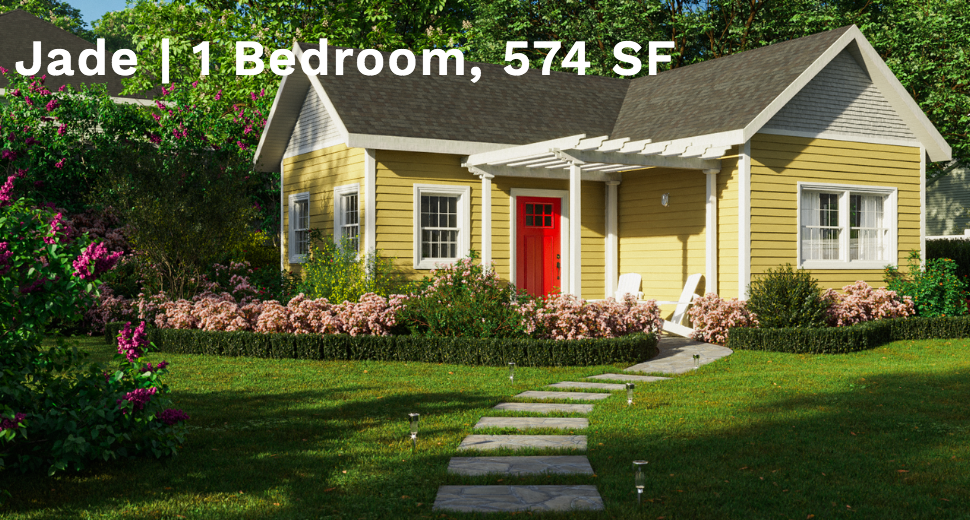Letter: Amherst Zoning Restrictions on Accessory Dwellings Are Now Illegal

Example of accessory dwelling unit (ADU) of 574 square feet. Proposed by the firm Backyard ADUs in a presentation to the Amherst Planning Board. Photo: Backyard ADUs
In succinct plain English, neighbor objections which in the past have succeeded in blocking ADUs (auxiliary dwelling units) in Amherst will no longer work. More ADUs added to existing rented single-family house properties are coming statewide.
Perhaps most significant for Amherst is the elimination of any owner occupancy requirement. That means any rented single family dwelling in a single family residential zoning district in Amherst is now entitled to one accessory dwelling unit as a matter of right.
Look here for a memorandum that I prepared about the new state zoning exemption for Accessory Dwelling Units.
Whether one supports or opposes ADUs, Amherst residents should be aware of this change in the law.
Look here for an excerpt from the current Amherst Zoning Bylaw, with the town’s restrictions on ADUs, most of which are now illegal because they violate state law.
Michael Pill
Michael Pill is a former resident of Amherst, and a current resident of Shutesbury. His law practice is based in Northampton.
Editor’s note: the photo above is provided courtesy of Backyard ADUs. They have also provided this link with additional information about the affordable homes act in Massachusetts.

The new law goes into effect in February. Amherst planners are working to revise the bylaw to conform with the new state requirements.
“That means ANY rented single family dwelling in a single family residential zoning district in Amherst is now entitled to one accessory dwelling unit as a matter of right.”
Thanks for bringing this to our attention Attorney Pill. The above statement or new stated law seems ridiculous to us. There are so many reasons why allowing an ADU at certain home locations should NOT be allowed. Lot size, parking arrangements to name a few. How much is too much for a residential street?
I would think the town itself can have its own regulations and I look forward to see what happens here in Amherst.
You picked a nice example of an ADU to showcase but I know many won’t be kept up. All you have to do is look at the non owner occupied single family houses that are rented in town. To be fair some are very nice.
Thanks for keeping us informed.
ADUs have been allowed by right in Amherst for a long time, but it required that either building be owner occupied. The fact that there aren’t many built might indicate that not many people in Amherst see that as the solution to make a little money at their home property. If it now becomes popular, now that there’s no owner-occupied requirement, it will obviously just be another way to create overcrowded/overpriced student housing in Amherst’s neighborhoods.
Landlords often say that many many of our renters aren’t students. I’m sure there are many, but maybe not many many. But again, why so few ADUs are built by homeowner occupants that wanted to create some income housing for young professionals, families, etc. The family needn’t squeeze into 1000 sq ft – aging baby boomer owners could live in the tiny house, and rent the main house to a family.
For the state to impose this everywhere is to again not understand the needs of a small town with a flagship university.
On the one hand, experience shows that fears of undergraduate student tenants destroying the peace and quiet of Amherst neighborhoods are justified, and by-right ADUs will make that worse. On the other hand, except for the student population, Amherst is a predominantly upper middle class community, and the exclusionary effect of single-family residential zoning helps keep it that way. Who can afford a house in Amherst today? See the online article “Exclusionary by Design: The History of Zoning in Boston Suburbs” (https://cayimby.org/blog/exclusionary-by-design-the-history-of-zoning-in-boston-suburbs/), with a link to Amy Dain “Exclusionary by Design: An Investigation of Zoning’s Use as a Tool of Race, Class, and Family Exclusion in Boston’s Suburbs, 1920 to Today” (https://www.bostonindicators.org/reports/report-detail-pages/exclusionary-by-design).
House prices are extremely high in all towns. If single family homes in Amherst are higher than average (though I think they aren’t), it could be because comparable sales of houses with 4+ students paying very high rent are driving prices up. Amherst has all the same housing shortage problems as elsewhere, and then much more so, because of the sky high demand by students. Obvious to many is that UMass should build several more dorms on campus. Students want that, too, evidenced by student protests that say so. The state is painting our delicate situation with a broad brush by allowing ADUs without an owner occupancy requirement.
Also, Michael, by saying “except for the student population, Amherst is a predominantly upper middle class” ignores that our town is HALF students, they are not an exception. Secondly, there are many full time residents of Amherst who are far from upper middle class. And surveys I have done show there are many in Amherst who feel they are in their last years of home ownership and would love to sell to a young family and move somewhere simpler, even a well built (thick walls) apartment or condo in Amherst center.
Ira,
I generally agree with you. However, my experience over the last 3-4 years of keeping a close eye on the single family home prices in Amherst (open houses et al) for an adult son who would like to relocate back to his home town after 25 years of living out west, has proven that such housing is indeed more expensive in Amherst than those in a number of other communities in “the Valley”. With so many houses having been/being snatched up for investment as student rentals, how could they not be?